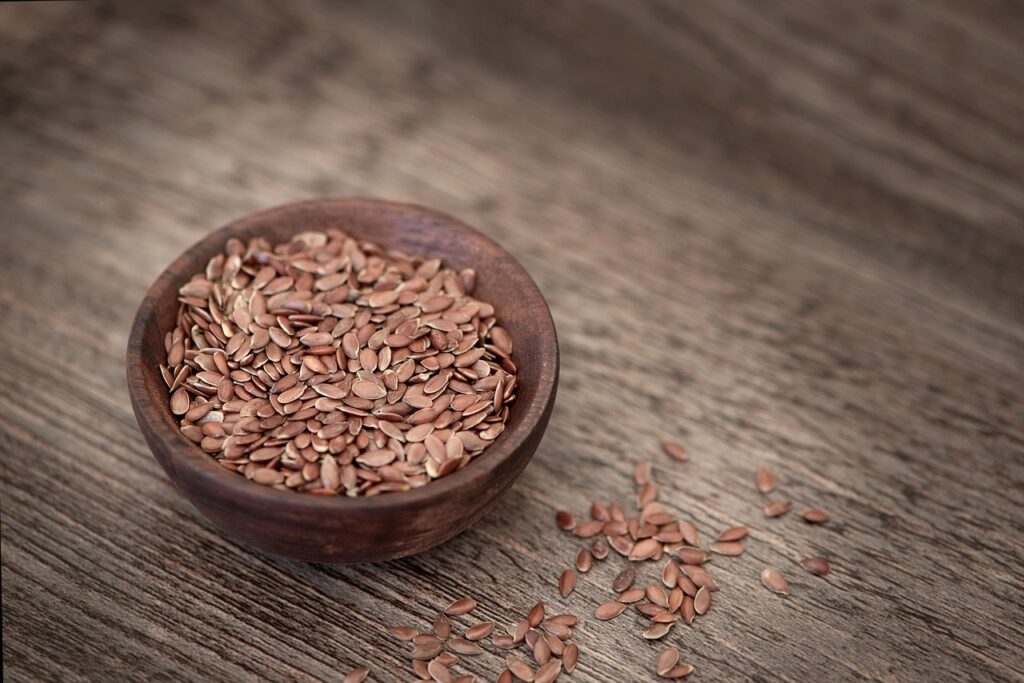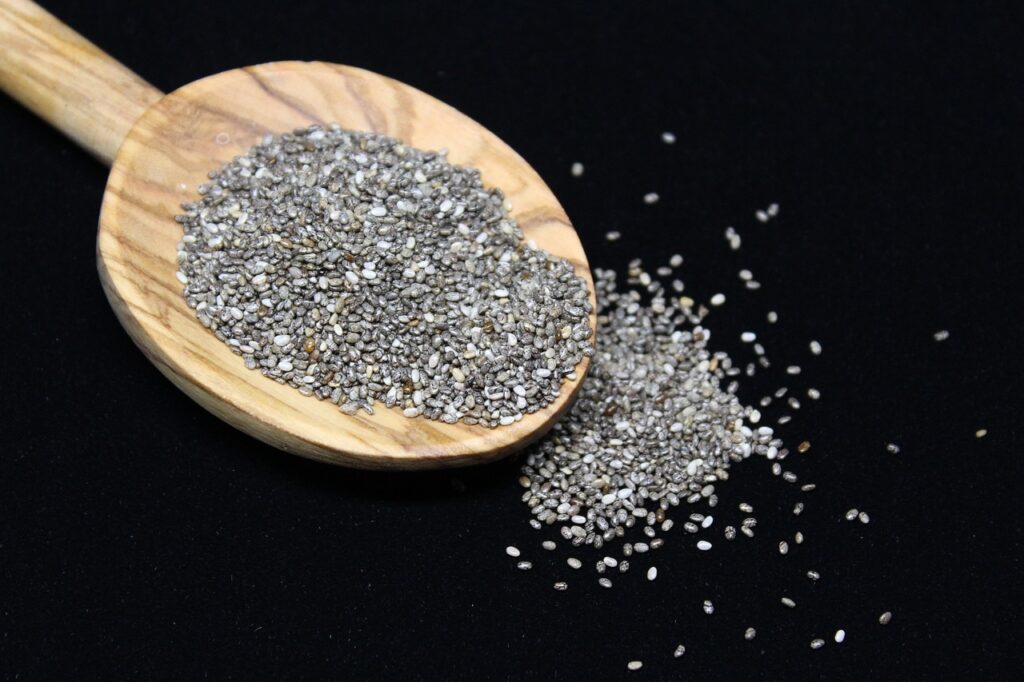Flax seeds and chia seeds are tiny powerhouses that are packed with essential nutrients, making them valuable additions to a healthy diet. In this flax vs chia seeds post, let us explore the differences and similarities between flax seeds and chia seeds, shedding light on their historical significance, cultivation methods, nutritional composition, health benefits, culinary uses, digestive considerations, allergies and side effects, sustainability and environmental impact.

Here’s a table summarizing the comparison between flax seeds and chia seeds
| Criteria | Flax Seeds | Chia Seeds |
|---|---|---|
| Historical Significance | Used since ancient times | Ancient Aztec and Mayan staple |
| Cultivation Methods | Grown in various regions | Primarily cultivated in Mexico, Bolivia, Argentina, and Australia |
| Protein Content | High | High |
| Omega-3 Fatty Acids | Abundant, particularly ALA | Abundant, particularly ALA |
| Fiber Content | High | High |
| Vitamins and Minerals | Vitamin E, B6, thiamine, magnesium, manganese | Calcium, phosphorus, magnesium, potassium |
| Health Benefits | Cardiovascular health, anti-inflammatory properties, potential cancer-fighting properties, skin and hair health | Weight management, blood sugar regulation, bone health, overall well-being |
| Culinary Uses | Added to baked goods, flaxseed oil in dressings and marinades, ground flax seeds in smoothies and oatmeal | Chia seed pudding and parfaits, chia gel as an egg substitute, sprinkled on salads and yogurt |
| Digestive Considerations | Benefits of ground seeds for absorption, potential digestive side effects | Hydration and liquid absorption properties, digestive sensitivity |
| Allergies and Side Effects | Allergy risks, potential interactions with medications | Allergy risks, cross-reactivity with other seed allergies, interactions with blood-thinning medications |
| Sustainability | Cultivated with eco-friendly practices, biodegradable components | Sustainable farming methods, water-efficient |
| Buying and Storage Tips | Whole seeds vs. ground flax seeds, refrigeration or freezing for storage | Quality indicators, proper storage in a cool, dark place |
History and Cultivation
Flax Seeds: Flax seeds have been used for centuries, with historical evidence dating back to ancient civilizations such as Babylon and Egypt. They were highly regarded for their medicinal properties and were commonly used for their laxative effects and as a source of dietary fiber. Today, flax seeds are cultivated in various regions around the world, including Canada, China, India, and the United States. The cultivation process involves planting the flax plant, allowing it to grow and mature, and then harvesting the seeds for consumption.
Chia Seeds: Chia seeds have a rich history, dating back to the ancient Aztec and Mayan civilizations, where they were considered a staple food. These civilizations recognized the exceptional nutritional value of chia seeds, consuming them to boost energy and endurance. In modern times, chia seeds are primarily cultivated in countries such as Mexico, Bolivia, Argentina, and Australia. The cultivation process involves planting chia plants, allowing them to reach maturity, and then harvesting the seeds.
Nutritional Composition
Flax Seeds: Flax seeds are a nutritional powerhouse, containing a diverse array of beneficial components. They are an excellent source of plant-based protein, containing all nine essential amino acids required by the body. Additionally, flax seeds are renowned for their high content of omega-3 fatty acids, particularly alpha-linolenic acid (ALA), which plays a crucial role in supporting heart health and reducing inflammation. These seeds are also packed with dietary fiber, promoting healthy digestion and aiding in weight management. Furthermore, flax seeds provide essential vitamins and minerals, including vitamin E, vitamin B6, thiamine, magnesium, and manganese.
Chia Seeds: Similar to flax seeds, chia seeds offer an impressive nutritional profile. They are rich in plant-based protein, providing all the essential amino acids required by the body. Chia seeds are also an excellent source of omega-3 fatty acids, particularly ALA, which supports heart health and reduces inflammation. Moreover, chia seeds contain a substantial amount of dietary fiber, both soluble and insoluble, which aids in digestion and promotes a healthy gut. These seeds are packed with essential vitamins and minerals, including calcium, phosphorus, magnesium, and potassium.

Health Benefits
Flax Seeds: Flax seeds offer a wide range of health benefits. Their high content of omega-3 fatty acids contributes to cardiovascular health by reducing the risk of heart disease and lowering cholesterol levels. Flax seeds also possess anti-inflammatory properties, aiding in the management of conditions such as arthritis and promoting joint health. Studies suggest that flax seeds may have potential cancer-fighting properties, particularly in reducing the risk of breast, prostate, and colon cancers. Furthermore, the nutrients present in flax seeds contribute to healthy skin and hair, promoting a youthful appearance.
Chia Seeds: Chia seeds have gained recognition for their numerous health benefits. Due to their high fiber and protein content, chia seeds promote weight management and provide a sense of satiety, helping to curb cravings and control calorie intake. They also contribute to blood sugar regulation, making them beneficial for individuals with diabetes or those aiming to maintain stable blood glucose levels. Chia seeds support bone health by providing essential minerals like calcium, phosphorus, and magnesium, which are vital for maintaining strong and healthy bones. Additionally, chia seeds exhibit antioxidant properties, protecting the body against cellular damage and contributing to overall well-being.
Culinary Uses
Flax Seeds: You can incorporate flax seeds into a variety of culinary creations. Add them to baked goods and bread recipes to enhance the nutritional value of these items. Use flaxseed oil, derived from flax seeds, in dressings and marinades to provide a nutty flavor and a dose of healthy fats. Sprinkle ground flax seeds on top of smoothies or add them to oatmeal to enrich these dishes with fiber, protein, and essential nutrients.
Chia Seeds: Chia seeds bring versatility to the kitchen. You can use them to create chia seed pudding and parfaits, offering a delightful and nutritious breakfast or snack option. Create chia gel by mixing chia seeds with liquid, and use it as an egg substitute in recipes, particularly suitable for individuals following a vegan or egg-free diet. Additionally, sprinkle chia seeds on top of salads or add them to yogurt for a pleasant crunch and to enhance the nutritional content of these dishes.
Digestive Considerations
Flax Seeds: Ground flax seeds are recommended for better absorption of their nutrients. The grinding process breaks down the hard outer shell of the seeds, allowing the body to access the beneficial components easily. It is important to note that some individuals may experience digestive side effects, such as bloating or gas, when consuming flax seeds. Starting with small quantities and gradually increasing the intake can help minimize these effects. Additionally, it is advisable to drink an adequate amount of water when consuming flax seeds to support digestion.
Chia Seeds: Chia seeds have unique properties that contribute to their digestive benefits. When mixed with liquid, chia seeds form a gel-like substance due to their high soluble fiber content. This gel helps with hydration and can aid in maintaining a healthy balance of fluids in the body. Some individuals may experience digestive sensitivity to chia seeds, so it is best to start with a small amount and monitor the body’s response. Drinking sufficient water is essential when consuming chia seeds to prevent any potential discomfort.
Allergies and Side Effects
Flax Seeds: Although rare, some individuals may be allergic to flax seeds. Allergy symptoms may include skin rashes, itching, or difficulty breathing. Furthermore, flax seeds may interact with certain medications, such as blood thinners or hormone therapies. It is crucial to consult with a healthcare professional if you have any concerns or if you are taking medications that could potentially interact with flax seeds.
Chia Seeds: Allergic reactions to chia seeds are uncommon but possible. Individuals with allergies to other seeds, such as sesame or mustard, may be at a higher risk of developing a chia seed allergy. Cross-reactivity between these seeds can occur, leading to allergic symptoms. Additionally, chia seeds may interact with blood-thinning medications, so it is essential to seek medical advice if you are taking such medications and considering incorporating chia seeds into your diet.
Sustainability and Environmental Impact
Flax Seeds: Flax seeds are known for their environmentally friendly cultivation practices. They are often grown without the use of pesticides or synthetic fertilizers, reducing the environmental impact of their production. Furthermore, flax plants have biodegradable components, and the leftover plant materials after seed extraction can be repurposed as animal feed or utilized in other industries, minimizing waste.
Chia Seeds: Chia seeds are cultivated using sustainable farming methods that prioritize ecological balance and biodiversity. These methods often involve promoting natural pollinators, minimizing chemical inputs, and protecting the local ecosystem. Additionally, chia plants require less water compared to many other crops, making them relatively water-efficient and reducing the strain on water resources.
Buying and Storage Tips
Flax Seeds: When purchasing flax seeds, you have the option of whole seeds or ground flax seeds. Whole seeds have a longer shelf life, but their nutrients are not as readily accessible to the body. Ground flax seeds provide better nutrient absorption due to the broken seed coat but have a shorter shelf life. Prefer to store flax seeds in an airtight container in the refrigerator or freezer to maintain their freshness and prevent oxidation.
Chia Seeds: When buying chia seeds, look for quality indicators such as a fresh aroma and uniform color. Always purchase chia seeds from reputable brands or sources to ensure their purity and safety. Storing Chia seeds in an airtight container at a cool, dark place, such as a pantry will help preserve their nutritional value and prevent spoilage.
The Bottom Line
Adding flax seeds and chia seeds into your diet can provide a multitude of health benefits. These nutritional powerhouses offer a rich source of protein, omega-3 fatty acids, fiber, vitamins, and minerals. Flax seeds contribute to cardiovascular health, anti-inflammatory effects, potential cancer-fighting properties, and skin and hair health.

Sandra Hernandez, a resident of New York, is an active contributor on lifebing.com. Her passion for knowledge fuels her writing journey as she delves into fascinating topics that capture her curiosity.
